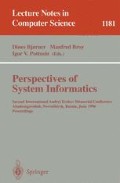Abstract
The declarative nature of assertive languages, resulting in properties such as referential transparency, allows for rapid prototyping and modifiability. These properties facilitate an application of a program transformation to the formal development of reasonably efficient explicitly parallel programs. The example chosen is that one of the discrete Fourier transform. We start with a declarative program which follows directly from a mathematical specification of a problem; we then perform a series of transformations, each aimed at “tailoring” a program to a target architecture. The final version, for which we offer an occam2 implementation, is an annotated explicitly parallel program.
Preview
Unable to display preview. Download preview PDF.
References
M. Chen, Y. Choo, J. Li. Crystal: Theory and pragmatics of generating efficient parallel code. In Parallel Functional Languages and Compilers B. Szymanski, editor, pages 255–308. Addison-Wesley, 1991.
C.M. Hoffman and M.J. O'Donnell. Programming with equations. ACM Trans. on Programming Languages and Systems, 4(1), pages 83–112, 1982.
P. Hudak. Para-Functional Programming in Haskell. In Parallel Functional Languages and Compilers B. Szymanski, editor, pages 159–196. Addison-Wesley, 1991.
C. Lengauer, M. Barnett, and D. Hudson. Towards systolizing compilation. Distributed Computing(1991) 5: 7–24.
U. Banerjee, R. Eigenman, A. Nicolau, and A. Padua. Automatic program parallelization. Proceedings of the IEEE, 81(2): 211–243, 1993.
C. Mongenet. Mapping for communications minimization using distribution and alignment. In Parallel Architectures and Compilation Techniques, L. Bic et al editors, pages 185–193, IFIP, 1995.
INMOS Ltd. occam 2 reference manual, Prentice Hall International (U.K.) Ltd., 1988.
S. Rajopadhye and R. Fujimoto: Synthesizing systolic arrays from recurrence equations. Parallel Computing 14(2): 163–189, 1990.
P. Quinton. Automatic synthesis of systolic arrays from uniform recurrent equations. Proc 11th Ann Int Symp on Computer Architecture, pages 208–214. IEEE Computer Society Press, 1984.
S. Sedukhin, and E. Trichina. An automated procedure for synthesis of systolic/wavefront arrays. In CONPAR'88, C. Jesshope and al, editor, pages 335–34. Cambridge University Press, 1989.
B. Szymanski. EPL — Parallel programming with recurrent equations. In B. Szymanski, editor Parallel Functional Languages and Compilers, pages 51–104. Addison Wesley, 1995.
E. Trichina. From functional equations to occam programs: Systolizing compilation. In L. Bic and al, editor, Parallel Architectures and Compilation Techniques, pages 310–315. IFIP, 1995.
Y. Wong and J-M. Delosme. Broadcast removal in systolic algorithms. In Proc Int Conf on Systolic Arrays, pages 403–412. IEEE Computer Society Press, 1988.
Author information
Authors and Affiliations
Editor information
Rights and permissions
Copyright information
© 1996 Springer-Verlag Berlin Heidelberg
About this paper
Cite this paper
Trichina, E. (1996). Derivation of explicitly parallel code from declarative program by transformations. In: Bjørner, D., Broy, M., Pottosin, I.V. (eds) Perspectives of System Informatics. PSI 1996. Lecture Notes in Computer Science, vol 1181. Springer, Berlin, Heidelberg. https://doi.org/10.1007/3-540-62064-8_16
Download citation
DOI: https://doi.org/10.1007/3-540-62064-8_16
Published:
Publisher Name: Springer, Berlin, Heidelberg
Print ISBN: 978-3-540-62064-8
Online ISBN: 978-3-540-49637-3
eBook Packages: Springer Book Archive

